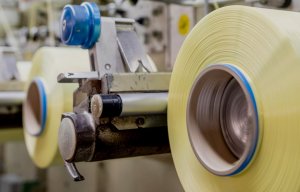
Circular success with Twaron
Teijin has developed aramid fibre based fabric which protects users against X-ray and gamma-ray radiation. From this May onwards, the company will provide samples to selected customers for applications such as protective clothing and sheet materials used around high levels of radiation, including the medical field, reconstruction activities in disaster-hit north eastern Japan and radiation testing.

24th April 2013
Innovation in Textiles
|
Tokyo
Teijin has developed aramid fibre based fabric which protects users against X-ray and gamma-ray radiation. From this May onwards, the company will provide samples to selected customers for applications such as protective clothing and sheet materials used around high levels of radiation, including the medical field, reconstruction activities in disaster-hit north eastern Japan and radiation testing.
The newly developed radiation shielding Technora fabric is produced by blending radiation-shielding tungsten particles with Teijin’s Technora high-strength para-aramid fibre.
According to the company, the new product offers the following key features:
Due to the superior strength and modulus of para-aramid fibre, the product is stronger than polyester and other general-purpose fibres despite containing high concentrations of tungsten, a high-density metal that tends to impair the fibre’s mechanical properties
The level of radiation shielding corresponds to the amount of tungsten blended into the aramid fibre
Fabric products offer excellent flexibility and workability for use in way not possible with lead plates or concrete
In addition, Teijin says, tungsten-blended Technora fabric exceeds the already high levels of flame retardancy and cut resistance exhibited by the regular Technora aramid fibre. As such, Teijin expects its new fabric to be used in materials and protective clothing for people handling high-temperature objects and/or sharp-edged rubble and tools.
“While it is generally difficult to produce filament yarn by blending a high-density metal with fiber, Teijin has overcome this challenge by leveraging its spinning know-how and the inherent properties of Technora. The uniform blending of tungsten and fibres is achieved with Teijin’s well-established polymer and spinning technologies,” Teijin said in a press statement today.
Teijin’s high-strength para-aramid fibres Twaron and Technora and meta-aramid fibre Teijinconex, which offers superior long-term heat resistance and flame retardancy, are available for a wide range of solutions where enhanced protection is required, such as law enforcement, fire fighting and manufacturing.
In Japan, where the Great East Japan Earthquake of 2011 has raised concerns about radiation in the region due to damaged nuclear reactors, Teijin believes that its new aramid fabric will provide solutions that help to ensure the safety of workers involved in reconstruction.
“Lead and lead-containing materials are typically used to shield against radiation because lead is comparatively inexpensive and exhibits excellent shielding. However, due to concerns about the environmental impact of lead, movements are underway to regulate its global use. Tungsten is now being used as an alternative for radiation shielding because it has relatively little impact on the human body or the environment,” Teijin said.
“Tungsten for radiation shielding is available in the form of fiber and sheet, and in hybrid materials such as resin or rubber blended with tungsten. It has been difficult to produce a tungsten hybrid in the form of fiber, however, due to problems with blending fiber with a high-density metal like tungsten. In addition, high-density metal blended in a high concentration with fiber using conventional methods tends to lose its strength and modulus.”
Teijin is a world leader in aramid fibres. Renowned for their strength, sustainability, safety, heat resistance and low weight, Twaron, Technora and Teijinconex can be found worldwide in different applications and markets including automotive, ballistic protection, marine, civil engineering, protective clothing, and oil and gas.
Teijin’s para-aramid fibres, Twaron produced by Teijin Aramid in the Netherlands and Technora produced by Teijin Limited in Japan, are - next to its high temperature resistance up to 400°C - noted for its exceptional strength in terms of bulletproof and stab-resistant properties, making it ideal for protective clothing. Teijin says they also are excellent as a friction material for automotive brake pads and as a reinforcement material for tyres and fibre optic cables.
Teijinconex, a meta-aramid fibre produced by Teijin Limited in Japan, is said to offer excellent long-term heat resistance and flame retardant properties, lending to its use especially for heat resistant protective apparel such as fire fighter gears and industrial uniforms. It is also used as a reinforcement material for heat-resistant filters, rubber belts and turbo charge hoses.

Business intelligence for the fibre, textiles and apparel industries: technologies, innovations, markets, investments, trade policy, sourcing, strategy...
Find out more